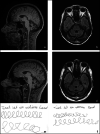Familial writer's cramp: a clinical clue for inherited coenzyme Q10 deficiency
- PMID: 32830305
- PMCID: PMC7997836
- DOI: 10.1007/s10048-020-00624-3
Familial writer's cramp: a clinical clue for inherited coenzyme Q10 deficiency
Abstract
The spectrum of coenzyme Q10 (CoQ10) deficiency syndromes comprises a variety of disorders, including a form of autosomal recessive cerebellar ataxia (ARCA2) caused by mutations in the AarF domain-containing kinase 3 gene (ADCK3). Due to the potential response to CoQ10 supplementation, a timely diagnosis is crucial. Herein, we describe two siblings with a novel homozygous ADCK3 variant and an unusual presentation consisting of isolated writer's cramp with adult-onset. Cerebellar ataxia developed later in the disease course and remained stable during the follow-up. This report highlights that ARCA2 should be considered in the differential diagnosis of familial writer's cramp.
Keywords: Ataxia; Coenzyme Q10; Dystonia; Magnetic resonance spectroscopy; Mitochondrial disease; Ubiquinone.
Conflict of interest statement
The authors declare that they have no conflict of interest.
Figures


References
-
- Galosi S, Barca E, Carrozzo R, Schirinzi T, Quinzii CM, Lieto M, Vasco G, Zanni G, di Nottia M, Galatolo D, Filla A, Bertini E, Santorelli FM, Leuzzi V, Haas R, Hirano M, Friedman J. Dystonia-Ataxia with early handwriting deterioration in COQ8A mutation carriers: a case series and literature review. Parkinsonism Relat Disord. 2019;68:8–16. doi: 10.1016/j.parkreldis.2019.09.015. - DOI - PubMed
-
- Mollet J, Delahodde A, Serre V, Chretien D, Schlemmer D, Lombes A, Boddaert N, Desguerre I, de Lonlay P, Ogier de Baulny H, Munnich A, Rötig A. CABC1 gene mutations cause ubiquinone deficiency with cerebellar ataxia and seizures. Am J Hum Genet. 2008;82(3):623–630. doi: 10.1016/j.ajhg.2007.12.022. - DOI - PMC - PubMed
-
- Horvath R, Czermin B, Gulati S, Demuth S, Houge G, Pyle A, Dineiger C, Blakely EL, Hassani A, Foley C, Brodhun M, Storm K, Kirschner J, Gorman GS, Lochmüller H, Holinski-Feder E, Taylor RW, Chinnery PF. Adult-onset cerebellar ataxia due to mutations in CABC1/ADCK3. J Neurol Neurosurg Psychiatry. 2012;83(2):174–178. doi: 10.1136/jnnp-2011-301258. - DOI - PubMed
Publication types
MeSH terms
Substances
LinkOut - more resources
Full Text Sources

